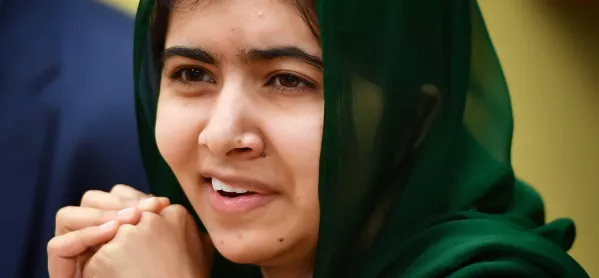Improving girls’ education will be critical in turning around the climate crisis, Nobel Peace Prize-winning activist Malala Yousafzai has said today.
Gender equality cannot be treated as a struggle separate from that of arresting climate change, she and other young activists told delegates in Glasgow today.
Ms Yousafzai spoke at the New York Times Climate Hub, a series of climate events running in parallel to the COP26 climate summit taking place nearby in Glasgow.
COP26: Teachers a ‘trusted source’ on climate change
Climate crisis: 3 big things teachers can learn about during COP26
Long read: The key role that schools can play in tackling the climate crisis after COP26
WATCH: Nobel winner’s COP26 message for old schools
Climate change: How can pupils and teachers get involved in COP26?
Quick read: How to use COP26 to reduce pupil climate anxiety
At today’s event - The Power of Knowledge: Girls’ Education as an Accelerator of Climate Action - she highlighted that there are “many marginalised communities where girls are disproportionately affected by climate change”, with “millions of girls every year at risk of losing their education because of climate disasters”.
Ms Yousafzai, who was jointly awarded the Nobel Peace Prize in 2014 at the age of 17, added: “So climate, gender equality and girls’ education are not separate issues; they are all interlinked. And that’s why taking climate change seriously is important to ensure that all of us can have access to safe and quality education, and that we see gender equality in the world.”
Ms Yousafzai, who spoke via video link, also said that “treating climate change and gender equality in education as separate issues is not doing justice to the cause of creating a fairer, better and cleaner world for all of us”.
Vanessa Nakate, a climate justice activist from Uganda, said: “We cannot have climate justice if more than half the world’s population is left behind.”
She added that “the girls who are already most likely not going to be able to go to school or to finish school are from the communities that are already on the frontline of the climate crisis”.
She pointed to issues such as forced marriage, and said that some girls and young women actually volunteered to be married because their families would then receive payments which might mitigate the impact of problems “exacerbated by the climate crisis”.
Leah Thomas, the California-based founder of the Intersectional Environmentalist platform, underlined the importance of learning the history of the environmental justice movement.
“And when you learn that history, you’ll realise that so many climate solutions have been there all along,” she said.
She also advised that young people should spend time “really figuring out what’s going on in their own local community because chances are they are already doing really amazing work when it comes to environmental justice”.
She added that ”education is key first because education leads to empowerment”.




